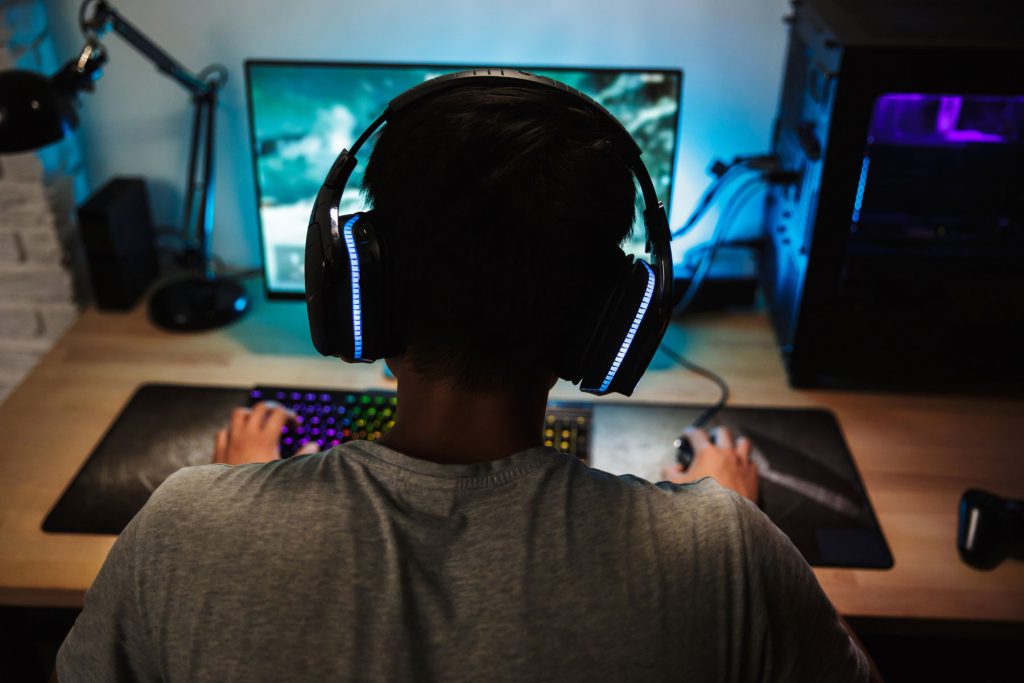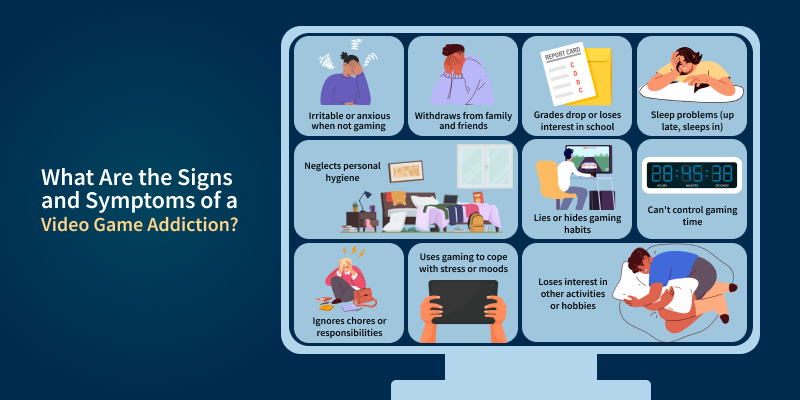“Just one more,” “I can’t pause an online game, you’ll have to wait,” “Do I have to go out?” There’s a good chance you’ve heard your son say at least one of these before. Video games might seem like his life, but are they addictive? Should you be worried?
Yes, video games can be addictive
While you might only think of drugs and alcohol as being addictive, behaviors can be, too. For instance, gambling. Gambling addiction is very real and becoming more of a concern now, alongside the rise in popularity of mobile sportsbooks and casino apps. Video games target many of the same areas of the brain that gambling does, which is why they can be so appealing—and so addictive.
Hijacking the brain’s reward system
The parts of the brain that influence reward, pleasure, and motivation are in the dopamine system. Dopamine is a chemical in the brain, sometimes known as the “feel-good” chemical. One way many people feel a rush of dopamine—and its related pleasure—is after being rewarded upon completing a task. Video games require creative problem-solving and grinding through challenges before a reward, which makes it feel worth it. They also use variable reward timing, like making defeating some boss levels extra rewarding or presenting an easy, relaxing side quest in the middle of an especially hard level, to keep players engaged.
Why are games so appealing to teens?
Games aren’t just rewarding after sinking some time into them, they’re also spaces where people can interact and are designed to be stimulating, everlasting, and fun to look at.
- Social hubs: Like broadcast TV, online games are places where people with similar interests can come together and enjoy the same media at the same time. Teens can hop on a few rounds of Fortnite with their friends instead of talking with mom or dad. Many games host exclusive, scheduled events that bring even more people together to play at once.
- Stimulating, never-ending designs: Unlike games on older systems, many games today just don’t end. Online games may not have a specified end goal or continually release updates or downloadable content (DLC) that keeps gamers hooked.
- Exclusive content: Character skins, seasonal items, and rare loot can all be up for grabs from randomized rewards. For some games, these drops almost look like slot machines, with many requiring real money transactions to participate.
- Career aspirations: The strength of the communities that games and the influencers that play them create can’t be denied. In fact, many teens stream their own playthroughs on Twitch, YouTube, or Discord with their friends or publicly and make money doing so. The rise in popularity of streaming and social media can seem like a lucrative career opportunity.
Some games have more addictive potential than others, but it all depends on what your teen finds most engaging. Massive multiplayer online role-playing games (MMORPGs), competitive games, and mobile games are all especially appealing. These are easy places where teens can hang out together and get lost for a few hours. Unfortunately, though, teens don’t always have great decision-making or impulse control skills, so these hours can get longer and longer.
How a gaming addiction can affect your teen’s life
When your teen spends all of their time playing or thinking about gaming, they probably have an unhealthy relationship with video games. As appealing as they are, they can easily cause teens to fall behind in school, harm in-person relationships, and drag down their mental health. If you notice that your son or daughter is falling behind and seems to spend every waking minute on their phone or computer, they might have a gaming addiction.
Gaming & mental health
Falling behind on homework and spending hours online might be what you notice, but there’s probably something deeper that your teen is struggling with. Mental health issues cause stress, and most teens don’t have the language to communicate how they’re feeling or what kind of pressure they’re under. Gaming is an easy, appealing way to blow off steam and disconnect from the pressures of the real world for a while.
Some mental health conditions may make teens more prone to have poor relationships and boundaries with gaming.
Anxiety
Gaming lobbies and multiplayer interactions can be less stressful than in real-life (IRL) relationships. Less pressure to be perfect or to say the right thing can be an attractive part of gaming for teens with anxiety. However, escaping reality isn’t the healthiest way to establish or maintain relationships, and teens can start having more issues communicating with family or friends IRL. These poor coping mechanisms can reinforce anxiety and make it worse.
Depression
Negative emotions can be so hard to escape when dealing with depression, but that’s exactly what video games offer. Slipping into another world, one where it’s more peaceful, controllable, and explorable is an attractive offer. But spending so much time on gaming, which leads to failed responsibilities and isolating (even if they’re chatting in the game), making depression even worse.
OCD
Some recent research has shown that preteens with obsessive-compulsive disorder may struggle to set boundaries with games because they are so repetitive and expansive that they’re able to sink a lot of time into them without much perceived risk. On the other hand, excessive gaming might also trigger new OCD behaviors in adolescents. This might be because of the rewards players receive for repetitive actions.
ADHD
Teens with ADHD can be especially drawn to gaming because of how fast they receive feedback and how stimulating the designs are. Impulse control and hyperfocus are also ADHD traits that can lend to gaming addiction. Teens might hyperfocus on clearing a level or topping the leaderboard and have trouble quitting or stepping away from the game even if they know it’s an issue.
What you can do at home
It’s frustrating watching your teen sink all of their time into a digital world, and it’s probably having some real effect on the rest of your family. Know that if the game is getting in the way of everything else, they’re probably dealing with something more serious. Be compassionate and understanding when you’re talking with them about gaming but be clear that there need to be some changes.
These are some things you can do to help your teen:
- Set clear limits: Try setting scheduled times for gaming and using timers to let them know when it’s time to log off.
- Encourage other hobbies: Gaming can be a creative, healthy outlet as long as it’s not the only thing in their life. Other interests like programming, digital art, and 3D printing use a lot of the same skills but give them the opportunity to meet up with others in real life.
- Model healthy behavior: If you spend a lot of time on your phone, watching TV, or even gaming yourself, take some breaks so your teen can learn how to set healthy boundaries.
- Promote social interaction: Getting together with friends IRL is important for teens. Give them some space to do so in healthy, approachable ways.
- Be realistic with expectations: If your teen is dealing with a lot of pressure or having a hard time coping with their emotions, it won’t be as easy to approach some things in real life, but it will be healthier. Be open about what they might feel and how you can help.
Sometimes, you won’t have all the answers, and that’s okay. Reaching out for help can get your teen the support they need to set better boundaries and work on their mental health. The teen mental health experts at Family First have more than 120 years of combined clinical experience and can help your son explore his mental health while helping him build better gaming habits.


